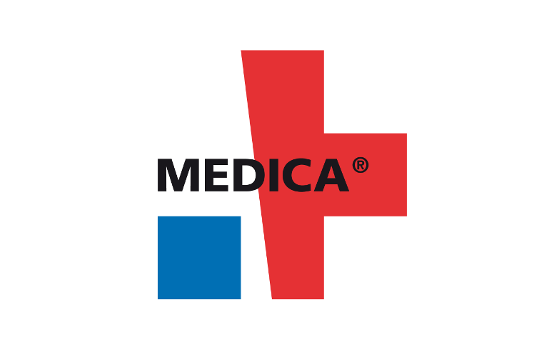 12 - 15 November 2018, Düsseldorf, Germany.
12 - 15 November 2018, Düsseldorf, Germany.When top decision-makers in the healthcare business meet in Düsseldorf in the middle of November at the world's leading medical trade fair, MEDICA 2018, they will once again be greeted by over 5,000 exhibitors from almost 70 countries, as consistent partners who are enthusiastic about innovation and offer tailored solutions for outpatient and clinical care. Digital transformation remains at the top of everyone's list this year. It is shaping the health economy worldwide and changes both processes and business models alike.
This prevailing trend will not only be represented by exhibitor innovations at the MEDICA, but is also reflected in the programmes of the accompanying conferences and forums.
These conferences and forums include the MEDICA HEALTH IT FORUM (on IT topics such as big data, artificial intelligence and cyber security), the MEDICA CONNECTED HEALTHCARE FORUM (hardware and software solutions for connected healthcare) and the MEDICA MEDICINE & SPORTS CONFERENCE, held entirely in English, which takes a look at the use of applications which are used in close proximity to the body and wearables for monitoring vital signs.
"Regardless of the progress achieved by digital medicine: The main focus in care is and always will be on human beings. For example, in medical imaging, artificial intelligence allows accurate analyses to be executed and relevant image data to be pre-selected for diagnoses. This accelerates the diagnostic process and offers doctors valuable support in their decision making. However, the doctor's evaluation remains authoritative," says Horst Giesen, Global Portfolio Director for Health & Medical Technologies at Messe Düsseldorf, outlining an example of the ideal interplay between humans and machines.
Creative Start Ups Provide Stimuli
Many innovative young companies are taking up the global digitalisation trend in the healthcare sector. Many of them will be present at MEDICA, for example at the MEDICA START-UP PARK. In parallel, a fine selection of company founders will present their latest ideas in the MEDICA CONNECTED HEALTHCARE FORUM sessions (which all take place in Hall 15). Among the product innovations that will be discussed and presented are a smartphone ophthalmoscope to examine retinas and eyes, which consists of a camera adapter and an app; a novel procedure for diagnosing skin cancer (which also consists of a smartphone app) and a compact digital stethoscope. Designed to work without earphones, this was developed to be used by concerned parents rather than doctors. The compact stethoscope head allows them to carry out a primary check-up of their child's airway and transmit the data to a doctor. Depending on the result, this allows them to spare themselves time-intensive visits to the doctor’s.A significant strength of the MEDICA is that it not only presents solutions for individual medical specialist disciplines in one place over a few days, but also takes on the complete workflow of patient treatment. The individual focal points are clearly structured according to hall and include: Electromedicine / medical technology (approx. 2,500 exhibitors), laboratory technology / diagnostics, physiotherapy / orthopaedic technology, commodities and consumables, information and communication technology, medical furniture and specialist furnishings for hospitals and practices.
This year, once more in parallel to the MEDICA, COMPAMED will take place for the 27th time with approx. 800 exhibitors (Halls 8a and 8b). A while ago, the items presented here would have generally included simple parts, components and equipment for technical devices and medical products, but today, COMPAMED is a hotspot for complex high-tech solutions such as innovative materials, microtechnology and nanotechnology.
Over the previous years, MEDICA and COMPAMED have regularly received between 120,000 and 130,000 visitors between them annually, with around 60% of these visitors coming from outside Germany. This year, the German Federal Minister of Health, Jens Spahn, will be among the visitors. On November 12, he will open MEDICA 2018 and the 41st German Hospital Conference, which takes place in parallel.
Together, MEDICA and COMPAMED take over the entirety of Düsseldorf's exhibition centre. They exclusively address professional visitors.
Opening times: 10:00 am - 18:00 pm / 12 - 15 November 2018
For further information, please visit:
http://www.medica-tradefair.com
http://www.compamed-tradefair.com